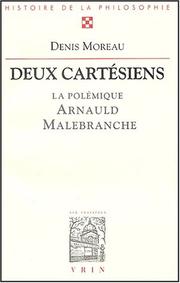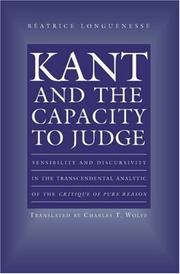| Listing 1 - 7 of 7 |
Sort by
|
Book
Year: 1964 Publisher: New York : Octagon Books,
Abstract | Keywords | Export | Availability | Bookmark
 Loading...
Loading...Choose an application
- Reference Manager
- EndNote
- RefWorks (Direct export to RefWorks)
Plato. --- Platon. --- Platon --- Plato. --- Et la théorie de la connaissance.
Book
ISBN: 1487599331 1442683031 Year: 2016 Publisher: Toronto : University of Toronto Press,
Abstract | Keywords | Export | Availability | Bookmark
 Loading...
Loading...Choose an application
- Reference Manager
- EndNote
- RefWorks (Direct export to RefWorks)
Bernard Lonergan's theological writings have influenced religious scholars ever since the first publication in the 1940s of the series of five articles which make up Verbum: Word and Idea in Aquinas. These articles first appeared in Theological Studies and were subsequently republished in book form in 1967 under the present title. This volume contains a new preface by the editors and full translations of all Latin texts.Verbum: Word and Idea in Aquinas is a product of Lonergan's eleven years of study of the thought of Thomas Aquinas. The work is considered by many to be a breakthrough in the history of Lonergan's theology and a foundation upon which his later contributions were constructed. Here he interprets aspects in the writing of Aquinas relevant to trinitarian theory and, as in most of Lonergan's work, one of the principal aims is to assist the reader in the search to understand the workings of the human mind.Verbum: Word and Idea in Aquinas is a vital component of Lonergan's oeuvre, and of continuing relevance to trinitarian theology, Aquinas studies, and inquiries into human cognition.Bernard Lonergan (1904-1984), a professor of theology, taught at Regis College, Harvard University, and Boston College. An established author known for his Insight and Method in Theology, Lonergan received numerous honorary doctorates, was a Companion of the Order of Canada in 1971 and was named as an original members of the International Theological Commission by Pope Paul VI.
Philosophy, Modern --- Theology --- History --- Thomas, --- Et la theorie de la connaissance.
Book
ISBN: 0585104689 9780585104683 025332713X 9780253327130 Year: 1986 Publisher: Bloomington : Indiana University Press,
Abstract | Keywords | Export | Availability | Bookmark
 Loading...
Loading...Choose an application
- Reference Manager
- EndNote
- RefWorks (Direct export to RefWorks)
Knowledge, Theory of --- Philosophy --- Philosophy & Religion --- Epistemology --- Theory of knowledge --- Psychology --- Knowledge, Theory of. --- PHILOSOPHY --- Epistemology. --- Hegel, Georg Wilhelm Friedrich, --- Et la theorie de la connaissance. --- Contributions in theory of knowledge. --- Mental philosophy --- Humanities --- Hegel, Georg Wilhelm Friedrich, - 1770-1831
Book
Year: 1948 Publisher: London : Oxford university press,
Abstract | Keywords | Export | Availability | Bookmark
 Loading...
Loading...Choose an application
- Reference Manager
- EndNote
- RefWorks (Direct export to RefWorks)
Bien. --- Das Gute. --- Good and evil. --- Good and evil. --- Het Goede. --- Kennis. --- Respublica (Plato). --- Wissen. --- Plato. --- Platon --- Platon. --- Platon --- Flaemmings, Friederich. --- Plato, --- Et le bien. --- Et la théorie de la connaissance. --- Republic (Plato).

ISBN: 2711613771 9782711613779 Year: 1999 Publisher: Paris : J. Vrin,
Abstract | Keywords | Export | Availability | Bookmark
 Loading...
Loading...Choose an application
- Reference Manager
- EndNote
- RefWorks (Direct export to RefWorks)
De 1683 à 1694, Antoine Arnauld et Nicolas Malebranche, anciens " amis " et prêtres que leur intérêt pour Descartes, leur révérence pour Augustin et leur commune inquiétude face au " libertinage " semblaient pourtant destiner à s'entendre, polémiquèrent violemment. En insistant sur l'aspect philosophique de ces débats, cet ouvrage propose la première interprétation d'ensemble de cette célèbre confrontation. Y a-t-il de sérieuses raisons philosophiques au désaccord entre Arnauld et Malebranche ? Leur détermination permet-elle d'éclairer certains aspects du malebranchisme ? Existe-t-il une philosophie d'Antoine Arnauld et peut-on en préciser les contenus ? Répondre à ces trois questions amène à éclaircir trois champs de recherche. En premier lieu, la polémique entre Arnauld et Malebranche fut un événement intellectuel. Nombreux furent les grands esprits contemporains qui prirent position et se trouvèrent ainsi impliqués, à des degrés divers, dans l'empoignade. En signalant leurs réactions, on voit apparaître les contours des camps philosophiques des années 1680, ainsi que quelques-unes des lignes de fracture conceptuelles qui contribuèrent à cette " crise de la conscience européenne " dont parlait Paul Hazard. En second lieu, les références à Descartes sont fréquentes chez Malebranche, incessantes chez Arnauld : en interrogeant le statut et les modalités de ces renvois et rapports croisés à une grande figure absente qui hante le débat, on précise le statut de la catégorie " cartésianisme " en histoire des idées. Enfin, Malebranche et Arnauld parlent souvent de Dieu. Au point de fuite de ce travail, on est alors conduit à une nouvelle interrogation : l'impuissance théologique du cartésianisme est-elle congénitale, ou bien peut-on tirer des dividendes théologiques de la philosophie cartésienne sans en faire jouer les structures et en modifier les concepts fondamentaux ?
Philosophy, French --- Philosophie française --- Arnauld, Antoine, --- Malebranche, Nicolas, --- -French philosophy --- Arnauld, Antoine --- Malebranche, Nicolas --- Philosophy. --- FILOSOFIA MODERNA --- Cartesianisme. --- Cartésianisme. --- Malebranche, Nicolas de, --- Et Malebranche. --- Et Dieu. --- Et Arnauld. --- Et Descartes. --- Et la théorie de la connaissance. --- -Arnauld, Antoine --- Philosophers --- Philosophie française --- Arnaud, Antoine, --- Arnaldus, Antonius, --- A. A. D. S. --- S., A. A. D. --- Arnauld, A. --- Arno, A., --- Arnauld, --- Arnauld, Antonio, --- Arnauld the Great --- Le Grand Arnauld --- Philosophy, French - 17th century --- Philosophers - France - 17th century --- Arnauld, Antoine, - 1612-1694 --- Malebranche, Nicolas, - 1638-1715

ISBN: 0691074518 0691043485 0691214123 Year: 1998 Publisher: Princeton (N.J.) Princeton university press
Abstract | Keywords | Export | Availability | Bookmark
 Loading...
Loading...Choose an application
- Reference Manager
- EndNote
- RefWorks (Direct export to RefWorks)
Kant claims to have established his table of categories or "pure concepts of the understanding" according to the "guiding thread" provided by logical forms of judgment. By drawing extensively on Kant's logical writings, Be;atrice Longuenesse analyzes this controversial claim, and then follows the thread through its continuation in the transcendental deduction of the categories, the transcendental schemata, and the principles of pure understanding. The result is a systematic, persuasive new interpretation of the 'Critique of Pure Reason'.Longuenesse shows that although Kant adopts his inventory of the forms of judgment from logic textbooks of his time, he is nevertheless original in selecting just those forms he holds to be indispensable to our ability to relate representations to objects. Kant gives formal representation to this relation between conceptual thought and its objects by introducing the term "x" into his analysis of logical forms to stand for the object that is "thought under" the concepts that are combined in judgment. This "x" plays no role in Kant's forms of logical inference, but instead plays a role in clarifying the relation between logical forms (forms of concept subordination) and combinations ("syntheses") of perceptual data, necessary for empirical cognition.Considering Kant's logical forms of judgment thus helps illuminate crucial aspects of the Transcendental Analytic as a whole, while revealing the systematic unity between Kant's theory of judgment in the first Critique and his analysis of "merely reflective" (aesthetic and teleological) judgments in the third Critique.
Kant, Immanuel --- Contributions in doctrine of judgment --- Judgment --- Judgement --- Knowledge, Theory of --- Language and languages --- Psychology --- Thought and thinking --- Wisdom --- Kant, Immanuel, --- Judgment. --- Jugement (logique) --- Jugement (Logique) --- Kant, Immanuel (1724-1804). --- Et la theorie de la connaissance. --- Et la logique. --- Et le jugement. --- Contributions in doctrine of judgment. --- Kritik der reinen Vernunft (Kant, Immanuel) --- Critik der reinen Vernunft (Kant, Immanuel) --- Immanuel Kant's Kritik der reinen Vernunft (Kant, Immanuel) --- Aristotle. --- Bennett, Jonathan. --- Critique of Judgment. --- Hume, David. --- Leibniz. --- Locke. --- Schematism. --- alteration. --- apperception. --- cause and effect. --- construction. --- essence. --- experience. --- geometry. --- guiding thread. --- imagination. --- intuition. --- mathematics. --- nothing. --- number. --- ontology. --- perception. --- quanta continua. --- reality. --- reflection. --- rule. --- schema. --- sensation. --- synthesis. --- transcendental ideal. --- world.
Book
ISBN: 0585104735 9780585104737 0253350050 9780253350053 0253176867 9780253176868 Year: 1983 Publisher: Bloomington, Ind. Indiana University Press
Abstract | Keywords | Export | Availability | Bookmark
 Loading...
Loading...Choose an application
- Reference Manager
- EndNote
- RefWorks (Direct export to RefWorks)
Knowledge, Theory of --- Philosophy & Religion --- Philosophy --- History --- Kant, Immanuel, --- Kant, Immanuel --- Kant, I. --- Kānt, ʻAmmānūʼīl, --- Kant, Immanouel, --- Kant, Immanuil, --- Kʻantʻŭ, --- Kant, --- Kant, Emmanuel, --- Ḳanṭ, ʻImanuʼel, --- Kant, E., --- Kant, Emanuel, --- Cantơ, I., --- Kant, Emanuele, --- Kant, Im. --- קאנט --- קאנט, א. --- קאנט, עמנואל --- קאנט, עמנואל, --- קאנט, ע. --- קנט --- קנט, עמנואל --- קנט, עמנואל, --- كانت ، ايمانوئل --- كنت، إمانويل، --- カントイマニユエル, --- Kangde, --- 康德, --- Kanṭ, Īmānwīl, --- كانط، إيمانويل --- Kant, Manuel, --- Knowledge, Theory of. --- Erkenntnistheorie --- Kennistheorie. --- PHILOSOPHY --- Theorie de la connaissance --- Epistemology. --- Histoire --- Kant, Immanuel. --- Kant --- Et la theorie de la connaissance. --- Erkenntnistheorie. --- Contributions in theory of knowledge. --- Mental philosophy --- Humanities --- Epistemology --- Theory of knowledge --- Psychology
| Listing 1 - 7 of 7 |
Sort by
|

 Search
Search Feedback
Feedback About UniCat
About UniCat  Help
Help News
News